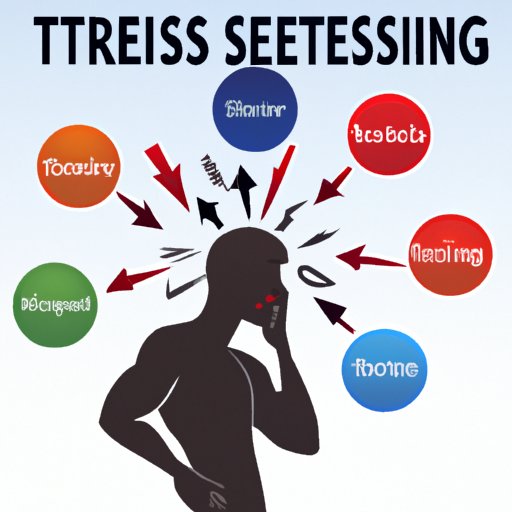
Introduction
Stress is a complex phenomenon that can manifest in a variety of ways, both mentally and physically. It’s a natural response to perceived threat or danger, but when stress becomes chronic, it can lead to a host of health problems. Inflammation, on the other hand, is the body’s response to infection or injury. While it’s a necessary and normal process, it can also become chronic and lead to serious health issues. Understanding the relationship between stress and inflammation is essential to promoting a healthy lifestyle and reducing the risk of inflammation-related diseases.
A Comprehensive Guide on the Relationship between Stress and Inflammation
Inflammation is a physiological process that occurs when the body detects an injury, infection, or tissue damage. It’s the body’s way of clearing out damaged cells and initiating the healing process. When the threat is neutralized, the inflammation subsides. However, when the threat is ongoing, the inflammatory response may persist, leading to chronic inflammation. Stress can be a significant factor in triggering inflammation, and there are several physiological mechanisms by which this can occur.
When the body is stressed, it triggers the release of stress hormones, such as cortisol, adrenaline, and noradrenaline. These hormones help the body prepare for the perceived threat, but when stress is chronic, the body remains in a constant state of alarm. This prolonged exposure to stress hormones can lead to chronic inflammation, which can damage tissues and organs over time, leading to serious health problems like heart disease, diabetes, and autoimmune disorders.
Understanding Chronic Stress and Its Effects on the Immune System
Stress comes in many forms, including acute stress, episodic acute stress, and chronic stress. Acute stress is short-term and usually subsides quickly. Episodic acute stress occurs when acute stress is frequent or prolonged. Chronic stress is long-term and ongoing, often caused by factors such as job stress, financial stress, or relationship stress.
Chronic stress can have a significant impact on the immune system. When the body is under constant stress, the immune system becomes overactive, leading to increased inflammation. This constant state of inflammation can lead to cellular damage and the development of inflammation-related diseases, as mentioned earlier. In addition, chronic stress can weaken the immune system, making the body more susceptible to infections and illnesses.
Stress and Inflammation: The Cause and the Cure
Cortisol is a stress hormone that plays a significant role in inflammation. In response to stress, cortisol is released to regulate the body’s response to inflammation. When cortisol levels remain high due to chronic stress, the body’s ability to regulate inflammation is impaired, leading to chronic inflammation. Reducing stress levels is essential to alleviate inflammation, and there are several ways to achieve this.
The first step in breaking the cycle of stress and inflammation is to identify the sources of stress. Once identified, these sources can be managed through relaxation techniques, physical activity, and mindfulness practices like meditation and deep breathing. In addition, regular exercise, a healthy diet, and adequate sleep can help reduce stress and inflammation levels.
How to Manage Stress to Prevent Inflammation-Related Diseases
The ability to manage stress in a healthy way is critical to reducing inflammation-related diseases. The following are some tips for managing stress:
- Regular exercise
- Meditation and relaxation techniques like deep breathing and yoga
- A balanced diet
- Adequate sleep
- Avoiding negative coping mechanisms like smoking, alcohol consumption, and overeating
Regular exercise, such as brisk walking, running, or weightlifting, releases endorphins, which are natural mood-boosting chemicals that help alleviate stress and reduce inflammation. Mindfulness practices like meditation and deep breathing can also be helpful in reducing stress levels. A balanced diet rich in essential nutrients like fruits, vegetables, and lean proteins, along with adequate sleep, can help regulate cortisol levels and promote overall health.
Can Stress Be the Root Cause of Your Inflammation? Here’s What Science Says
There is a significant amount of research supporting the connection between stress and inflammation. In one study, researchers found that people who took part in a stress reduction program had lower levels of inflammation compared to those who didn’t participate. Other studies have linked stress to increases in inflammation biomarkers, further supporting this connection.
While the research shows a strong correlation between stress and inflammation, more studies are needed to establish a causal relationship. However, the available evidence supports the notion that reducing stress levels can have a positive impact on health outcomes.
Simple Lifestyle Changes to Manage Stress and Inflammation
The best way to manage stress and inflammation is to make simple, healthy lifestyle changes that can be incorporated into daily routines. This might include:
- Regular exercise, such as a daily walk or yoga practice
- Mindfulness practices like deep breathing and meditation
- A balanced diet rich in fruits, vegetables, whole grains, and lean proteins
- Good sleep hygiene, including a consistent sleep schedule and a relaxing bedtime routine
- Avoiding negative coping mechanisms like smoking, alcohol consumption, and overeating
By incorporating these habits into daily life, individuals can reduce their stress levels and improve overall health outcomes.
Conclusion
Stress and inflammation are two prevalent health issues that can lead to serious health problems when left unchecked. Chronic stress can contribute to chronic inflammation, which can damage tissues and organs over time, leading to inflammation-related conditions. While the research linking stress and inflammation is still evolving, evidence has shown that managing stress levels can have a positive impact on health outcomes. By incorporating healthy habits like regular exercise, mindfulness practices, and a balanced diet, individuals can reduce their stress levels and take control of their health.
If chronic stress and inflammation are impacting your life, it’s essential to seek professional help. With the right tools and support, individuals can manage stress and inflammation and improve overall health and wellbeing.




